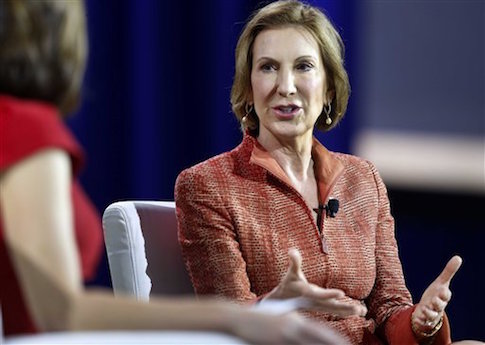As women working for Hillary Clinton’s presidential campaign struggle with a gender pay gap, women working for the businesswoman and Republican presidential candidate Carly Fiorina are coming out on top.
The median female annual salary on Fiorina’s campaign is $69,724, about $15,000 higher than the median male annual salary of $54,829, according to data made available to the Washington Free Beacon by the campaign.
The highest paid members of Fiorina’s staff are her campaign managers Frank Sadler and Sarah Isgur Flores, who both make $150,000 a year.
The next six highest salaries on the campaign are all for female employees. The lowest salary is for a male.
The campaign provided annual salary figures for staff on payroll as of the last Federal Election Committee filing deadline in July.
A previous Free Beacon analysis of salary data included in FEC filings for the Clinton campaign found that women working for Clinton are not faring as well as those working for Fiorina.
The analysis of payroll disbursements made by the Clinton campaign in June found that the projected annual salary paid to women to be about $7,000 less than what is paid to men.
When the analysis of Fiorina’s payroll was conducted using data from her FEC filing, the same method the Free Beacon used to calculate Clinton’s gender pay gap, the female projected annual salary was again $15,000 greater than the male projected annual salary.
The Clinton campaign has previously stated to the Free Beacon that "actual salary data" similiar to what the Fiorina campaign provided to the Free Beacon gives a more accurate assessment of pay than data included in FEC filings. The campaign has not made such information available.
Fiorina’s campaign says that it is not intentional that her campaign is stacked with women and that it is committed to hiring the best person available for all positions, regardless of gender or other factors.
"Carly believes in ruthlessly cultivating meritocracies and ensuring that the most talented people — men and women — have equal access to opportunities to rise through the ranks," Flores told the Free Beacon. "We’re proud of the team we have put together at Carly for President."
That team—despite the fact that it is working with 300 fewer people than Clinton’s massive campaign—has so far outperformed Clinton’s.
As Clinton continues to plummet in key polls, Fiorina has been a standout candidate since the first Republican primary debate, going from an outlier to a serious contender.
Fiorina has not paid much attention to the gender pay gap as a campaign issue—not because she does not believe it exists, but because she believes that the use of the issue by politicians such as Clinton "obscure the practices and policies that are truly keeping women from achieving their full potential."
Fiorina has stressed the importance of dismantling the use of seniority to determine pay grade, a system that she says "systematically disadvantages women" because it "rewards employees for time in grade, not for merit, performance, or hard work."
Fiorina, who herself rose to the top of Hewlett-Packard, said in April that if promotions are based on merit, "women will rise to the top."
"If you focus on a pay for performance system—a true meritocracy where people are recognized, paid, and promoted, not on how long they’ve been there, but what they produced—women will rise to the top," she said.
She criticized Clinton for using "cherry-picked statistics and quasi-facts," such as that women earn 77 cents for every dollar earned by men, rather than focusing on seniority structures in unions and government bureaucracies.
Clinton’s current campaign is not the first instance of her paying women less than men. In her Senate office, women earned just 72 cents for each dollar earned by men.
Despite being painted as a hypocrite on the issue by opponents, Clinton’s campaign has announced plans to ramp up its "war on women" language in key battleground states.
The Clinton campaign did not respond to a request for comment by press time.
